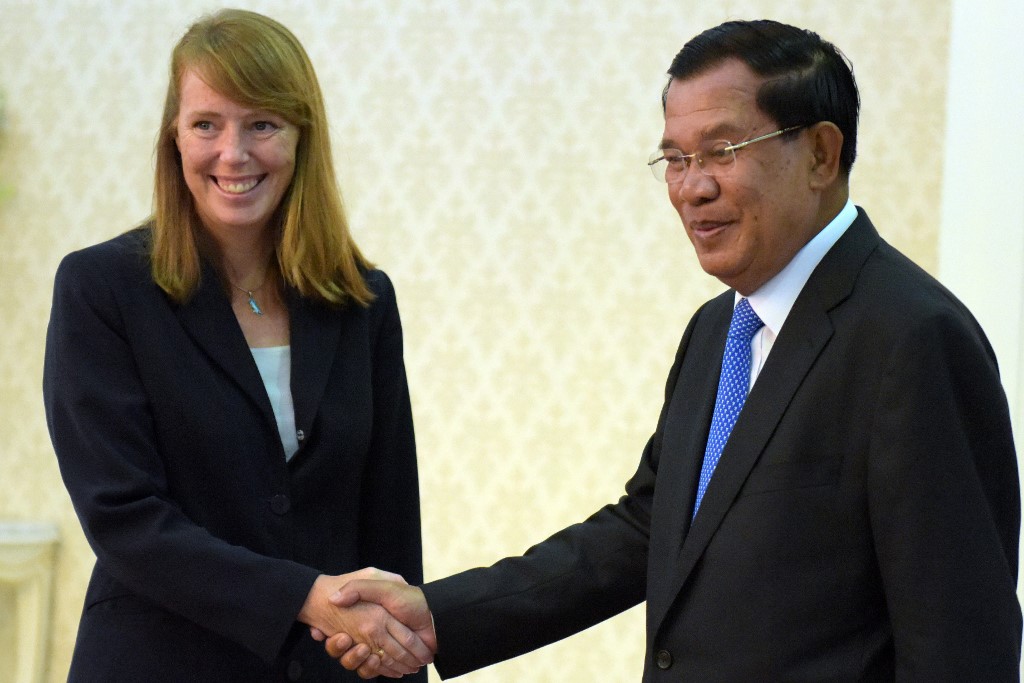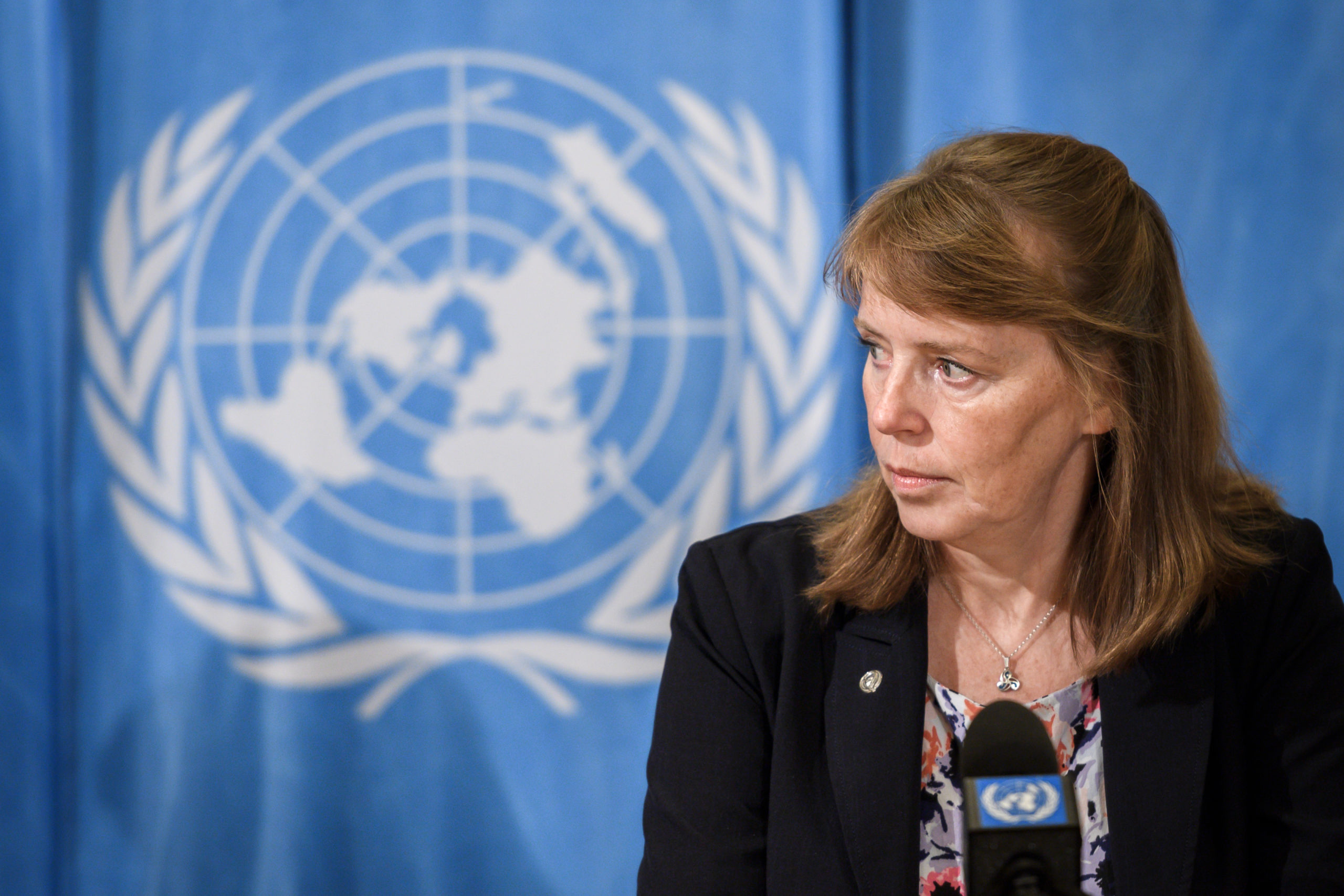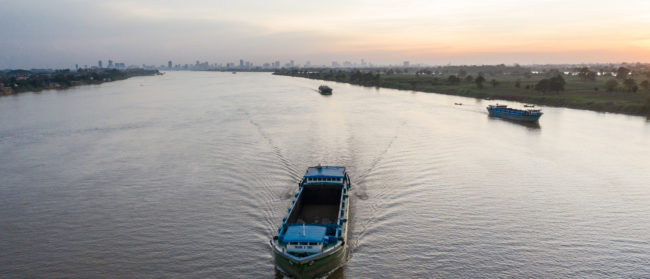From the dissolution of the political opposition, to a sustained crackdown on media and activism, the past five years have marked a sea change for Cambodian democracy and human rights.
It’s been more than enough to keep Rhona Smith busy, as the Special Rapporteur on the situation of human rights in Cambodia enters the final six-month stretch of her six-year tenure this month.
“There’s definitely evidence of continuing restrictions on civil society [in 2020],” said Smith. “2019 also brought a lot of challenges. As did 2018 and 2017 – take your pick.”
Smith spoke with the Globe last week via video chat from a locked-down northern England, where she is Professor of International Human Rights at Newcastle Law School. For more than five years she has been a regular visitor to the Kingdom in her role as a UN Human Rights Council-appointed independent expert, researching democracy and human rights developments on the ground and reporting back.
While pre-pandemic Smith would visit Cambodia twice a year, financial pressures on her mandate from within the UN, now combined with Covid-induced travel restrictions, are just some of the factors that have kept Smith from the Kingdom since her last visit in May 2019.
Like many, her role has become entirely remote this year, and where once she would have the opportunity to gather information on the ground, now she joins virtual meetings with government officials as she attempts to keep channels of communication open and human rights issues on the agenda. Regardless, the inherent limitations of monitoring Cambodia’s human rights situation from 10,000km away is not lost on Smith.
“I haven’t visited for more than a year and a half. Obviously this is a challenge,” she said. “At the moment there’s no missions pending, we’re waiting to see if we have permission to ask for visits in 2021, and if that’s the case then I will be requesting to visit. It may well be that I don’t get to visit [before my mandate is over in May 2021].”
But while the pandemic has brought many aspects of daily life to a grinding halt, it’s done little to stop the apparent downward spiral of Cambodian democracy and human rights, which has continued largely unabated in Smith’s absence this past year.
Most recently, last week, 121 ex-Cambodia National Rescue Party (CNRP) members and supporters were grouped in a mass trial at a hearing in Phnom Penh. The opposition figures, some of whom are senior party members now living in exile, were charged with conspiracy to commit treason and incitement to commit a felony in relation to the much-hyped failed November 2019 return of exiled CNRP co-founder Sam Rainsy. Such crimes carry sentences of up to 10 years in prison and feed into the rhetoric of Prime Minister Hun Sen’s ruling Cambodian People’s Party, which has repeatedly accused the opposition party of conspiring to topple their government through a “colour revolution”.
A 25 November public statement from Smith expressed her “serious concerns” around the “politically motivated” trials, while she told the Globe that she saw the opaque way they unfolded as violations of the judicial process and the defendents’ right to a fair trial.
“These people were arrested often at different times and then they are being brought together in the same criminal files for trial, which does present it more as a show of legal force,” said Smith. “The challenges are around some of the trial processes and the systems that have been put in place. For example, not everyone is clear what they’ve been charged with and therefore what they are attending court in connection with, [nor have they been] given the opportunity to adequately prepare a defence.”
But mass trials are just the tip of the iceberg, with this year alone seeing several developments that have left observers concerned of the direction the Kingdom is headed. In August, a draft Law on Public Order made headlines as it seemingly sought to restrict men from being topless in public and women from wearing revealing clothing, provoking the ire of women’s rights activists. Though the dress code caught most of the attention, if passed the broadly worded proposal could criminalise almost any public behaviour, including routine acts like begging on the street.
In more concrete legal developments, a controversial State of Emergency law was enacted in April by the Cambodian government, and while officially a pandemic prevention measure, the legislation’s ambiguous wording has left many concerned about its potential for abuse beyond public health scenarios.
Cambodia had no such law on the books before the pandemic, and Smith voiced public concerns about its implications at the time of its announcement. Now, months into the global outbreak, she’s still wary – even as she acknowledges that the provisions of the law are similar to those found elsewhere.
“In terms of the actual provisions of the law, many of them are similar to what you find in other countries,” she said. “[But] many of these laws in different countries are used to restrict human rights, when during a pandemic human rights should be prioritised.”
In the role as an independent individual, you’re trying to work through quiet diplomacy and other mechanisms to persuade a government to change laws and practices

Now, as her six-year term enters its final six months, Smith is looking to end her tenure and prepare the ground for her replacement come next May, in whatever form that will take within the mission to Cambodia.
Her role as special rapporteur is not one that has won her much love from the Cambodian government, at least not publicly. Though her work involves regular contact and cooperation with state officials – who, she said, have the opportunity to fact-check advance copies of her annual reports to the UN – Smith has also provided an easy target for public chiding and criticism.
In a pattern seen with her predecessors in the role, and one likely to continue with her successor, Smith has faced repeated accusations of impartiality from State officials during her tenure. ‘Respecting sovereignty’ has become a government catchphrase of sorts, as officials regularly implore Smith to abide by the Operational Manual of the Special Procedures of the Human Rights Council that guides her mandate.
Sovann Ke, the Cambodian permanent representative to the UN, has regularly dismissed even relatively anodyne observations from Smith, while she was rebuked by the government for behaving like a “teacher in a classroom” over her condemnation of the 2018 national election results that saw the CPP secure a clean sweep in the absence of any meaningful opposition.
But while too strong in her condemnation in the eyes of those in power, she has been labelled too timid by others hoping to challenge them. Unlike those that came before her, Smith has faced a cold shoulder from some human rights watchers, who say her work in Cambodia has not been direct enough in addressing abuses. In 2016, as Cambodia’s human rights situation showed signs of deterioration, Smith was accused of “failing to fulfil her mandate” by certain rights defenders.
While perhaps offering a more tapered tone than her predecessors when holding the government to account in the public sphere, Smith points to the diplomacy going on behind the scenes that few see.
“I think that’s something each of my predecessors has had – at certain times there have been these fraught relationships between the government and special rapporteurs. That’s because, in the role as an independent individual, you’re trying to work through quiet diplomacy and other mechanisms to persuade a government to change laws and practices,” she said.
“It’s something that is quite an awkward situation to be in, given the tensions in many UN member countries, including Cambodia, between the sovereignty of the State and monitoring human rights within that State.”
But between these two competing narratives surrounding her work, in reality her term has proven among the most challenging and eventful since the mandate was created following the signing of the 1993 Paris Peace Accords.
While once a country seemingly on a rocky and non-linear path to parliamentary democracy following decades of civil war, Smith’s mandate has coincided with several critical junctures in the decline of political and human rights in the Kingdom. This has included the banishment of the CNRP and arrest of its then-leader Kem Sokha in September 2017, as well as the contraction of independent press that saw the demise of the Cambodia Daily and the takeover of the Phnom Penh Post by a government ally.
Smith was also serving in her role when Kem Ley, a major civil society figure and government commentator, was murdered in broad daylight in July 2016. That slaying was followed by a stilted criminal investigation that produced implausible answers.
The government has got a much more sophisticated understanding, in my view, of human rights and how to use human rights. But that doesn’t necessarily mean there is an overall improvement on human rights
But almost paradoxically, as the State has constricted the real-world civic space, Smith believed an increasingly well-versed CPP elite was – for better or worse – demonstrating a stronger conceptual grasp of civil rights.
“[The government] has got a much more sophisticated understanding, in my view, of human rights and how to use human rights. But that doesn’t necessarily mean there is an overall improvement on human rights,” she said. “They are at least using the language, which is one step in the right direction, but it doesn’t necessarily mean human rights are stronger protected in the country.”
Smith thought it was “increasingly apparent” that this understanding was manifesting through a kind of legal warfare against dissent. This perhaps more subtle suppressing of dissent can be seen in last month’s mass trial, the July arrest of human rights defender Rong Chhun over a Facebook post, the indefinite suspension of Kem Sokha’s treason trial since March on an apparent public health rationale, as well as the seemingly endless espionage cases tying up Radio Free Asia journalists Uon Chhin and Yeang Sothearin in kafkaesque legal proceedings.
But looking ahead to her final six months and beyond, whoever Cambodia’s next special rapporteur may be, and however the role may manifest in terms of diplomatic or public standing, Smith described the mandate’s approach to human rights through “binary” and unbending legal terms.
“There’s a bigger issue with cultural relativity and these ‘Asian values’ debates,” she said. “But, from a strict legal point of view, the standards I am tasked with reporting on in Cambodia are the international human rights treaties Cambodia have signed – and they are black and white.”


